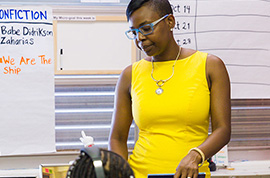


Role: Lead English Language Arts Teacher
School: KIPP Liberty Academy
What motivated you to become a teacher?
Many things—but my early experiences as a student gave me the outlook on educational equity I have to this day. I was born in Jamaica and moved to New York City when I was ten, where I attended a public school. One day in sixth grade, I heard my teachers talking about a new KIPP school in our neighborhood. I called the school myself to learn more about it. When I learned they wanted to speak to an adult—not me—I had my uncle call them back. I did a school tour on my own and enrolled at KIPP Academy as a seventh grader! That was my first experience with school choice.
As I started to plan my career, I thought I’d become a human rights lawyer. But life had a way of leading me back to education! After college, I worked as a student advocate at Harlem Children’s Zone and would frequently go into children’s homes and their school to find out what they needed to succeed. I saw how for some students, there was little support for their specific needs in the classroom. I helped them with homework and family life and realized I loved to teach and that one way of addressing human rights issues was by becoming a teacher.
I reached out to KIPP co-founder Dave Levin—who had been my KIPP principal as a student—when I decided I wanted to start teaching full time. He helped place me at KIPP AMP in Brooklyn and I worked there as a KIPP NYC Fellow.
What inspired you to teach at KIPP Miami? What does it take to succeed here?
When my former principal at KIPP AMP mentioned that there was a region launching in Miami, it was a thought that I pondered on deeply. Not only were my husband and I looking to move out of New York City, but it’s rare that you have the chance to found a school. The biggest plus was that we have family in Fort Lauderdale to help us with our three-year-old son.
To succeed, you need to have flexibility and a willingness to work hard! The work of a school in its founding year is very challenging, but full of rewards. It teaches you a lot about yourself and you have to be solutions-oriented. You may start a day with one priority and wind up tackling a completely different challenge. But at the end of the day, we have to work together to find solutions that benefit our kids.
What have your students taught you?
I’ve learned to listen for what they need. As a teacher, our lives are so busy. But if you’re noticing a behavior that you want to correct, it’s important to take the time to ask if the student is OK and what they need at that moment to succeed. As a teacher, I want to make use of every minute and I know that this kind of interaction can make a huge difference in a child’s day. Students are often grappling with big stuff outside the classroom and I want to create a space where they feel heard and safe.
I’ve also learned a great deal about listening to our community. We’re a new school and it takes time to build a rapport and build trust. I may be the same color as my students and share some of their experiences, but that doesn’t mean we have a lot in common. I have to listen to them and follow their lead to build productive relationships.
As an English teacher, what does it look like when your students are engaged in learning?
I love witnessing and supporting high-level thinking in the classroom—like when a student makes a connection between one book and another we’ve already read. I hear a lot of “Oh this part of The Shakespeare Stealer reminds me of Thunder Rolling in the Mountain,” and it’s amazing to see them developing important habits as readers and critical thinkers.
We do turn and talks where they speak with a partner and share their ideas about a text or predict why a character acted the way they did. I tell students that intellectual people are always thinking. I tell them there’s no dumb questions. I want my students to read on grade level as many came to us behind. I want them to be able to read a text and explain its main themes without assistance.